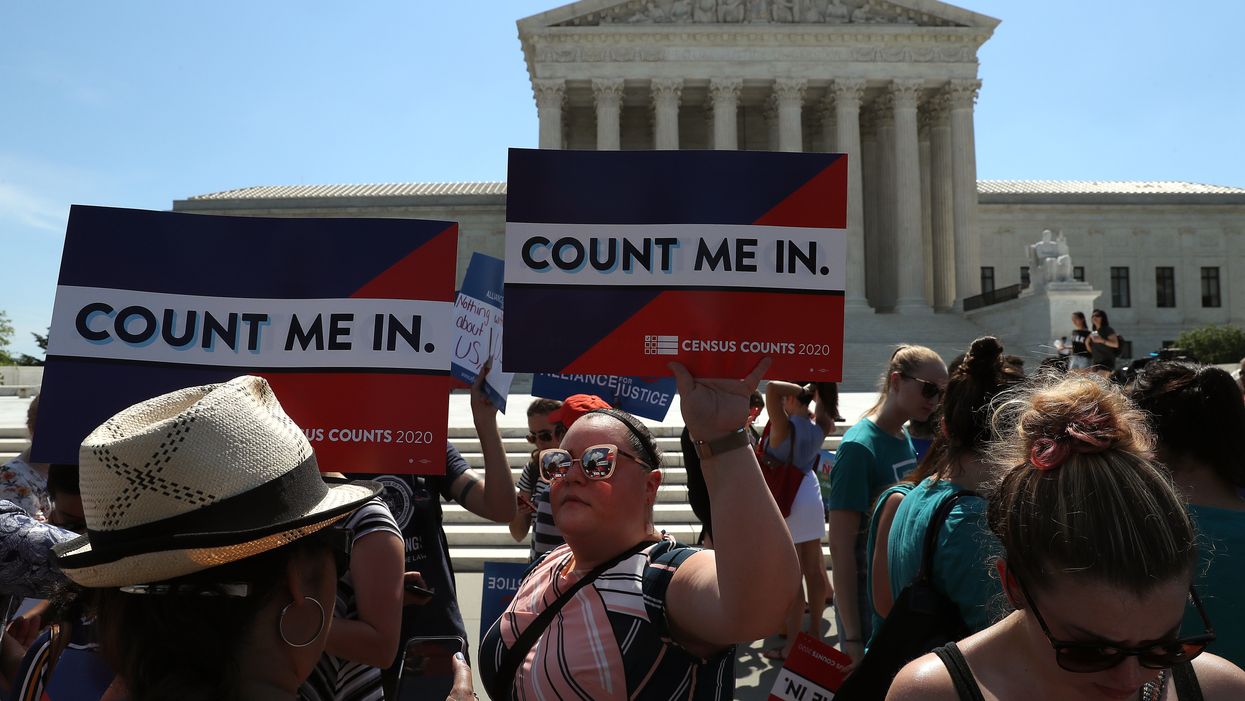Civil rights groups celebrated the government's decision to throw out the citizenship question from the 2020 census. But some worry the damage has already been done.
Simply the notion of having a citizenship question on the census could still deter residents, particularly those from immigrant communities, from participating next year. The mistrust and misinformation surrounding the census was further amplified Wednesday when President Trump tweeted that news reports indicating the Commerce Department had dropped the question were "FAKE!"
His tweet came less than 24 hours after Commerce Secretary Wilbur Ross, who oversees the Census Bureau, put out a statement saying the agency had already "started the process of printing the decennial questionnaires without the question."
The Census Bureau has estimated that the inclusion of a citizenship question would lead to an undercount of 6.5 million people. Since a large portion of people at risk of being undercounted are in the Latino community, the National Association of Latino Elected Officials Educational Fund has been working to identify and mitigate issueswith next year's census. That hasn't changed.
"Our work mobilizing the nation's second largest population group remains more important than ever as we attempt to rebuild the trust that has been eroded over the course of this struggle," Arturo Vargas, CEO of NALEO Educational Fund, said in a statement following the Commerce Department's decision to disregard the citizenship question.
Rebuilding trust around the census within the Latino community is going to be a difficult task, though — possibly more so now that Trump has added to the confusion. NALEO Educational Fund's nationwide ¡Hágase Contar! (Make Yourself Count!) campaign is working to communicate and engage with Latinos about the importance of participating in the 2020 census. The campaign is running a toll-free bilingual hotline — 877-EL-CENSO (877-352-3676) — to provide information and answer questions about the census.
The democracy reform advocacy group Common Causeis also conducting a project, Let's Count Everyone, to ensure participation and accuracy with the 2020 census. Through volunteer Complete Count Committees, Common Cause hopes to connect with residents and work with local governments to increase awareness of the census. These CCCs will develop plans for how to best tackle the census-related issues unique to the communities they cover.
"We still need to pour every ounce of energy into mobilizing every neighbor and all communities to complete the 2020 Census — we cannot allow these partisan attempts to politicize the 2020 Census deter a full count of every person in the United States as called for in the Constitution," Keshia Morris, census project manager for Common Cause, said in a statement.
House investigation continues
Meanwhile, House Oversight and Reform Chairman Elijah Cummings said Tuesday his committee would continue its investigation into the origins of the citizenship question.
In June, the committee voted to hold Attorney General William Barr and Ross in contempt of Congress for failing to provide requested materials related to the Trump administration's efforts to include the citizenship question. The subpoenaed documents are primarily memos and letters exchanged between the Justice and Commerce departments.
The contempt vote passed shortly after President Trump asserted executive privilege over the subpoenaed material and follows accusations by committee staff that the White House "directly and aggressively" interfered with the committee's interview last month with Kris Kobach, the former Kansas secretary of state.
The committee requested the interview with Kobach, a Republican, after he told reporters he proposed a citizenship question to Trump shortly after the inauguration and had conversations about it with Ross several months before the Justice Department asked the Commerce Department to include it on the 2020 questionnaire.
Ross originally told Congress the Justice Department asked Commerce to add the question so it could better enforce the Voting Rights Act. That testimony was largely discredited, however, after evidence emerged that showed Ross asked the Justice Department to make the request.
Last week, the Supreme Court barred the government from including the citizenship question based on Ross' claim that the Justice Department needed the data to enforce voting rights. Chief Justice John Roberts called the justification "contrived," but the ruling left open the possibility the Trump administration could return to the court with a different argument for including the question.
In a statement Tuesday, Cummings said he was "encouraged" the Trump administration decided to drop the question and allow the census to move forward but vowed the committee would continue its pursuit of the subpoenaed documents.
"The Trump Administration put our country through more than a year of wasted time and squandered resources – all in the service of an illegal attempt to add a discriminatory question based on a pretext," the Maryland Democrat said. "The Attorney General and the Secretary of Commerce must now turn over all of the documents our Committee has subpoenaed on a bipartisan basis."



















